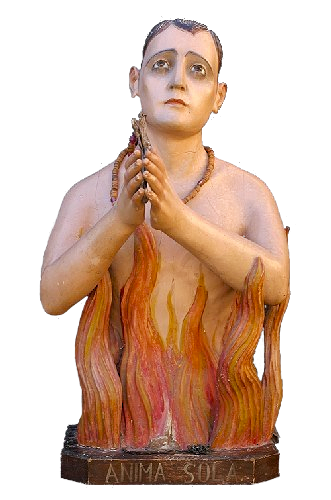TREATISE ON PURGATORY by St. Catherine of Genoa
CHAPTER III
SEPARATION FROM GOD IS THE GREATEST PUNISHMENT OF PURGATORY.
WHEREIN PURGATORY DIFFERS FROM HELL.

All the pains of purgatory take their rise from sin, original or actual. God created the soul perfectly pure and free from every spot of sin, with a certain instinctive tendency to find its blessedness in Him. From this tendency it is drawn away by original sin, and still more by the addition of actual sin; and the farther off it gets, the more wicked it becomes, because it is less in conformity with God.
Things are good only so far as they participate in God. To irrational creatures God communicates Himself, without fail, as He wills, and as He has determined; to the rational soul more or less, according as He finds it purified from the impediment of sin ; so that, when a soul is approaching to that state of first purity and innocence which it had when created, the instinctive desire of seeking happiness in God develops itself, and goes on increasing through the fire of love, which draws it to its end with such impetuosity and vehemence, that any obstacle seems intolerable, and the more clear its vision, the more extreme its pain. Now because the souls in purgatory are without the guilt of sin, there is nothing to stand between God and them except the punishment which keeps them back, and prevents this instinct from attaining its perfection ; and from their keenly perceiving of what moment it is to be hindered even in the least degree, and yet that justice most strictly demands a hindrance, there springs up within them a fire like that of hell. They have not the guilt of sin; and it is this latter which constitutes the malignant will of the damned, who are excluded from sharing in the goodness of God, and therefore remain in that hopeless malignity of will by which they oppose the will of God.
Reflection
For the rational creature, ignorance is not bliss. Willed ignorance of the good incurs judgement, and knowledge of but inability to achieve the good produces sorrow and suffering.
The irrational creature knows God according to His will. God wills a fish to be a fish, and a fish does fishy things and knows God in accordance with its fishy-ness. But a fish does not, by its reason, consider that it could be other than fish.
A rational creature knows God according to His will in the same way, because it has reason, can contemplate goods that are beyond its own God-willed nature. Goodness reveals itself to man, and man might contemplate the supreme good, which is God Himself, and seek to participate in His nature, or man might become distracted by the lights of lesser goods, and so debase his nature and become a beast.
The degree to which God communicates Himself to a rational soul is dependent upon how He has prepared that soul to receive Him, but also dependent upon the rational soul responding to that communication. In Purgatory, because a rational soul has seen God, she no longer desires any distracting lights, nor can she be distracted by them. Her rational soul’s vision is locked upon God, but her nature, deformed and distressed by sin, is hindered from doing that which God wills; which is not to be and do humany things but to perfectly receive and be united with the divine. It is the inability to do this, more accurately to have this done to her, that hurts.
Contemplation
Question: The greatest guilt for which those in hell suffer punishment for is their eternal willful refusal to accept ransom by the Blood of the Lamb. It is a non-rational choice to choose other than the mercy of God. In what ways, small and big, do we choose other than His mercy and cling in malice to lesser goods?
Question: On earth, we can seek to cultivate a sense of the presence and desire for God. In essence, this is the meritorious pre-participation in the fires of Purgatory by which the soul denudes itself of attraction to and desires for lesser goods. In what ways can we seek to blind ourselves to the allure of these lesser lights?
~ PPP
